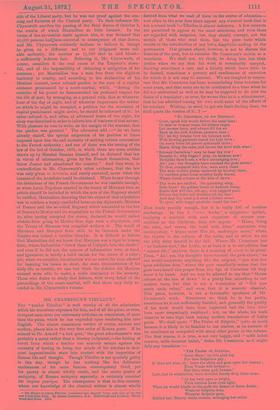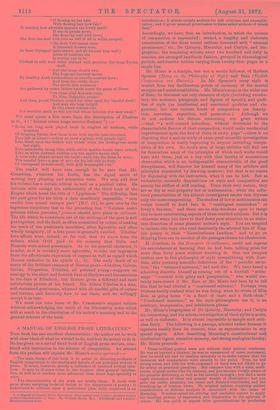MR. CRANSTOUN'S TIBULLUS.*
THE "tender Tibullus " is well worthy of all the admiration which his translator expresses for him, and Of all the pains, or even, to repeat once more our customary criticism on translators, of more than the pains, which he has expended upon rendering him into English. The almost unanimous verdict of critics, ancient and modern, places him in the very first order of Roman poets. If he seemed to Dr. Arnold " a bad poet," the great schoolmaster's was probably a moral rather than a literary judgment,—the feeling of revolt from which a teacher can scarcely escape against the necessity of having to bring the minds of his scholars in their most impressionable state into contact with the impurities of Roman life and thought. Though Tibullus is not specially guilty in this way, though he has nothing like the deliberate uncleanness of his more famous contemporary Ovid, yet his poetry is almost wholly erotic, and the erotic poetry of antiquity, of Roman antiquity especially, is certainly unsuited for Mrgines puerique. The consequence is that in this country, where our knowledge of the classical writers is almost wholly * The Llegia of Albius 2Wndlur; translated into English Verse, with Life of the Poet and Illustrative Notes. By James Oranstourt, RA. Edinburgh and London: Black- wood and Sons. 1872.
derived from what we read of them in the course of education— how often in the year does there appear any classical book that is not a school-book ?—Tibullus is almost unknown. A few extracts are permitted to appear in the usual selections, and even these are regarded with suspicion, lest they should corrupt, not the morals of those who read them, but the pure taste which revolts at the introduction of any but a disayllabic ending to the pentameter. Our present object, however, is not to discuss the beauties of the poet, but to examine Mr. Cranstouu's merits as a translator. We shall not, we think, be doing him less than justice when we say that his work is remarkably unequal, showing sometimes a care and a felicity which leave little to be desired, sometimes a poverty and carelessness of execution for which it is not easy to account. We are tempted to conjec- ture that Mr. Cranstoun has been accumulating these versions for some years, and that some are to be attributed to a time when he did not understand as well as he may be supposed to do now the duties of a translator ; or even, for we see that he is a schoolmaster, that he has admitted among his own work some of the efforts of his scholars. Wishing, as usual, to get our fault-finding done, we shall quote the version of ii., 2 :— "To CERINTRUS, ON HIS BIRTHDAY.
"Come, speak fair words before the natal faue : Or man or woman come, let silence reign, Let incense burn, and odours fill the air Such as the rich Arabian pastures bear ; Oh! let thy Genius view his honours now, With flowing garlands round his holy brow ; On every tress let purest spikenard shine ; Haste, bring the cake, and crown the bowl with wine!
"Beloved Cerinthus! may he hear thy vow ! Breathe it; why linger? pray, he beckons now ! Methinks thon'lt ask a wife's unchanging love ; Ah! yes: thy thoughts have reached the gods above ! To thee, compared with this, were sorry cheer The wide world's plains upturned by brawny steer, Or costliest gems from wealthy India drawn, Where Ooean colours at the kiss of dawn.
"Thy vows are ratified. On quivering wing, Dear Love! the golden bonds of wedlook bring, Bonds that will last, till age, with laggard pace, Silvers thy locks and wrinkles all thy face: And may thy natal god send children sweet, To sport, with happy gambols, round thy feet !"
That reads prettily enough, but it is really fall of careless
renderings. In line 4, "tester Arabs," a suggestive epithet, implying a contrast with such exporters of sterner com- modities as the Chalybes, does not appear. " Haste, bring
the cake, and crown the bowl with wine," represents very inadequately, " Atque satur libo sit, madeatque merb," where the Genius is the subject of the verbs, and in which we see the jolly deity feasted to the full. Where Mr. Cranstoun has
"be beckons now," the Latin, so at least it is in our edition, has " adnuet ille ;" anyhow, there is a meaning of assent to be given.
From, " Ah ! yes, thy thoughts have reached the gods above," no one would conjecture anything like the original, "jam reor hoe ipsos edidicisse deos," where the poet manifestly means that the- gods have heard this prayer from the lips of Cerinthus till they know it by heart. And we may be allowed to say that " Ocean- colours at the kiss of dawn" is a pretty line, according to our-
modern taste, but that is not a translation of " Eoi qua maris unda rubet," and even that it is scarcely classical..
This piece, however, is not a favourable specimen of Mr Cranstoun's work. Sometimes we think he is too prolix, sometimes he is not sufficiently faithful, and generally the quality
of his work would have been improved had the lime labor been more unsparingly employed ; but, on the whole, his work deserves to take high rank among modern translations of Latin poets. We shall quote "The Praise of Sulpicia," quite as much-
because it is likely to be familiar to our readers, as on account of its excellence as compared with many other pieces in the volume. The first stanza, it is true, is not very happy, and "snille habet.
ornatus, mills decenter habet," defies Mr. Cranatoun, as it might. defy any translator :—
" THE Plum OF SULP1CIA.
"Great Mars! on this glad day For thee Sulpicia's gay ; If thou art wise, oh! leave the skies and gaze upon her charms ;
Even Venus will forbear—
But thou, stern god, beware !
Lest, lost in admiration, thou shouldst basely drop thine arms.
" At her twin eyes so bright, Twin torches Love doth light, When he would kindle in the gods the flames of fierce desire ; Whate'er Sulpicia does, Where'er Sulpicia goes, Behind her, Beauty walks unseen, arranging her attire. "If flowing be her hair, With flowing hair how fair !
If braided, how adorable appears the lovely maid!
If she in purple move, She fires the soul with love ; She fires the soul with love as well if all in white arrayed.
"(So doth Vertumnus wear A thousand dresses rare, In blest Olympus' halls eterne, and all become him well.) Alone of maidens she Is worthy aye to be Clothed in soft wool twice stained with precious dye from Tyrian shell.
"And she alone should own The fragrant harvests mown By wealthy Arab husbandman in sweetly-scented lawn ; And from the ruddy shore The shells that evermore Are gathered by swart Indian hands anear the gates of Dawn.
"On these glad Kalends raise, Ye Nine, Sulpicia's praise! And thou, proud Phcebus, sound her fame upon thy tuneful shell!
And may she long delight In this sweet solemn rite, For worthier maid ye will not find whose honours you may swell."
We must quote a few more lines, the description of Phcebus in iii., 4 (" Intonsi crines longs cervice fluebant ")
Down his long neck played locks in ringlets all unshorn, while breathed Of dripping Syrian dew those locks with myrtle interwreathed. Face fair as Luna'a—colour as snow a-gleam with purple light, Like blush upon the bride's soft cheek when the bridegroom meets her sight, Like amaranths 'mong lilies white which maiden hands have twined, Like as when Autumn ruddies o'er the apple's waxen rind. A loose robe played around his heels—such was the dress he wore ; The tuneful lyre—a gem of art—by his left side he bore, Of variegated tortoise-shell, with gold bespangled o'er."
The reader will have seen enough to be sure that , Mr. Cranstoun, whatever his faults, has the signal merit of writing very pleasing and attractive verse. We may add that his volume has a certain critical as well as a poetical value. He defends with energy the authenticity of the third book of the Elegies which bears the title of " Lygdamus." The difficulty, that the poet gives for his birth a date manifestlY impossible, "cum cecidit fato consul uterque pari " (B.C. 41), he gets over by the ingenious conjecture that in the preceding line, " Natalem nostri primum videre parentes," prim= should give place to decimum. The life which he constructs out of the writings of the post is well put together, and the fault, so often committed by critics, of making too much of the passionate assertions, often figuratiVe and often wholly imaginary, of a love poem is generally avoided. Tibullus' love-affairs were, indeed, so far real, that we know from the tribute which Ovid paid to his memory that Delia and Nemesis were actual personages. As to his general character, it is safer, as it is certainly more agreeable, to take our impression from the affectionate expression of respect as well as regard which Horace embodies in his epistle (i., 4). The early death of so snany of the brilliant company of Roman poets—Catullus, Calvus, Propertius, Tibullus, all perished young—suggests an analogy to the short and feverish lives of Marlowe and his associates in the days of Elizabeth, but Horace gives a different and more satisfactory picture of his friend. His Albius Tibullus is a wise, self-restrained gentleman, adorned with all needful gifts of nature and fortune, and knowing how to use them, and we willingly accept it as true.
We must not take leave of Mr. Cranstoun's elegant volume without acknowledging the merit of the illustrative notes which add so much to the elucidation of his author's meaning and to the general interest of the book.



































 Previous page
Previous page